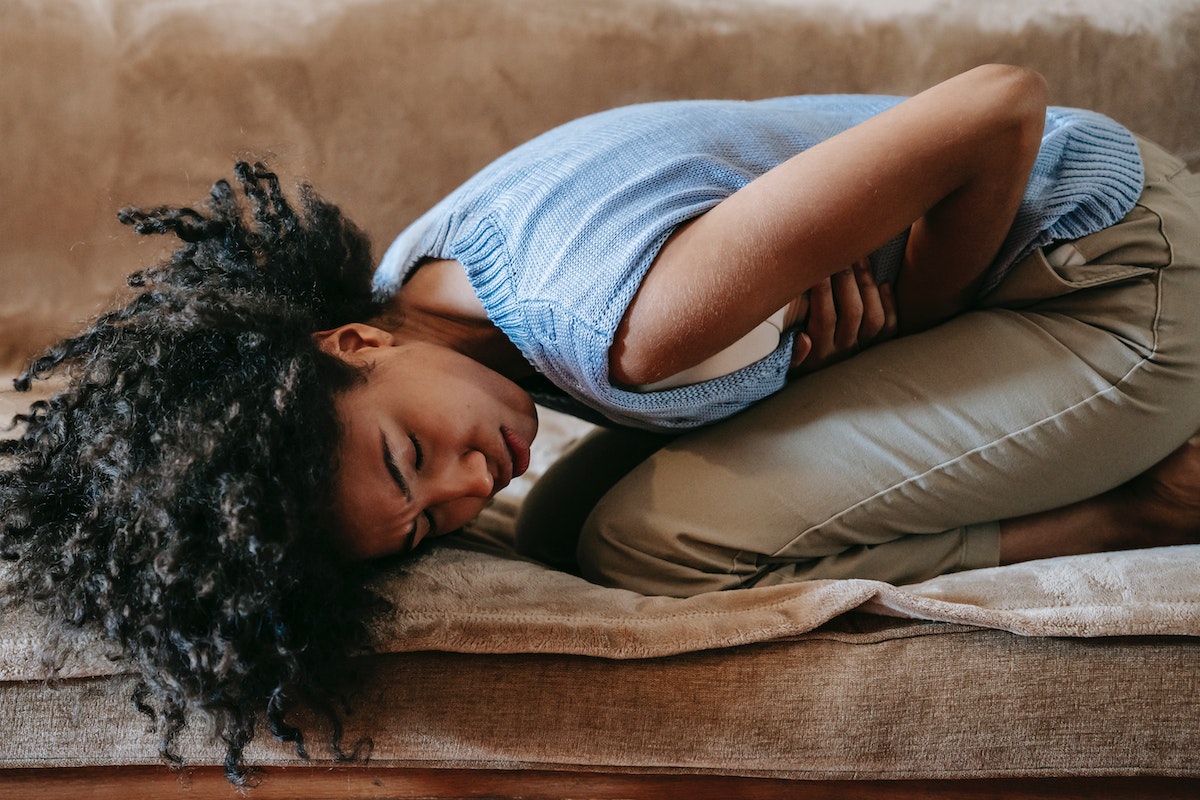When it comes to your menstrual cycle, a lot can happen. Women experience many different symptoms, ranging from cramps to bloating. These symptoms can be uncomfortable and sometimes even frustrating. One particularly painful symptom that often accompanies a period is constipation. It’s not only uncomfortable, but it can also be dangerous if left untreated. Some women experience constipation during their period, but what exactly is it, and why does it hurt?
This article will explain why constipation occurs during your period and how to combat it.

- Why Does It Hurt to Poop During Your Period?
- Common Causes of Painful Bowel Movements During Your Period
- Tips for Relieving Painful Bowel Movements During Your Period
- When to Seek Medical Advice for Painful Bowel Movements
- Frequently Asked Questions (FAQs) About Painful Bowel Movements During Your Period
- Is it normal to experience painful bowel movements during your period?
- What are some home remedies for alleviating bowel discomfort?
- Can birth control help with painful period bowel movements?
- What to do when it hurts to poop on your period?
- Why does my bum hurt when I poop on my period?
- Why does it hurt to pee or poop on my period?
- Are period cramps the same as poop cramps?
- How to poop on your period without it hurting?
Why Does It Hurt to Poop During Your Period?
Many women experience painful cramps during their periods, and constipation can make them even worse. This is because your digestive system naturally slows down during your period. As a result, food takes longer to digest and can get trapped in the large intestine. But other factors can also contribute to this.
Hormonal Changes
As your body prepares for your period, several hormonal changes take place. Specifically, your body releases higher levels of progesterone and estrogen. These hormones can affect the muscles in your digestive tract, making them contract more slowly and causing constipation. This can lead to cramps and a feeling of fullness, even if you haven’t eaten much.
Increased Prostaglandin Levels and Bowel Contractions
Prostaglandin is a hormone-like substance that your body releases during your period. It helps regulate muscle contractions and can cause cramps. During your period, the level of prostaglandin increases, leading to stronger bowel contractions and further constipation. This can cause pain associated with constipation.
Endometriosis
While not as common, some women with endometriosis may experience more severe constipation. Endometriosis is a condition in which the tissue of the uterus grows outside of it. This can lead to an obstruction in your intestines, resulting in constipation and pain. Not every woman with endometriosis experiences constipation, but it is a possibility.
Common Causes of Painful Bowel Movements During Your Period

Of course, constipation isn’t the only cause of painful bowel movements during your period. Other causes include:
Dysmenorrhea
Dysmenorrhea, or painful periods, is a common symptom of menstrual cramps. These cramps occur in the lower abdomen and can be so severe that they make it difficult to pass stools. It can be excruciating if you’re dealing with constipation and have to strain.
Constipation
When you’re constipated, your body has difficulty passing stools. This can cause pain and cramping in the lower abdomen, bloating, and an inability to poop. Some women also experience nausea and headache. If you’re dealing with constipation, it can make your period much more uncomfortable.
Inflammatory Bowel Diseases (IBD) and Period Symptoms
When someone has IBD, their body’s immune system attacks the lining of the intestines. This can lead to inflammation and cramping, which can be especially painful during periods. Women with IBD may also experience constipation, nausea, diarrhea, and bloating. They may even have difficulty eating.
Tips for Relieving Painful Bowel Movements During Your Period
You don’t have to suffer in silence when relieving constipation during your period. There are several ways to help ease the discomfort and make it easier to pass stools:
Incorporating Fiber-Rich Foods into Your Meals
Fiber can help keep your digestive system running smoothly and make it easier to pass stools. Eating foods high in fiber can help keep you regular. These foods can also help reduce bloating by absorbing water in your intestines. This will help ease the pain of constipation. Here are some examples:
-Beans
-Legumes
-Avocados
-Apples
-Berries
-Oats
-Whole grains
Improving Digestive Health through Diet and Hydration
A healthy diet and good hydration can go a long way in improving digestive health and relieving constipation. Your body can process food much faster with a good balance of vegetables, fruits, proteins, and whole grains. Drinking plenty of water throughout the day will also help keep your digestive system running smoothly. Liquids help push the food through your intestines and can help alleviate constipation.
Gentle Exercises to Promote Bowel Regularity

Different gentle exercises like walking, yoga, and swimming can help alleviate constipation. These activities will help move your intestines and promote bowel regularity. Try these exercises at least three times a week to keep your digestive system running smoothly. If you’re feeling terrible during your period, opt for low-impact exercises that don’t require too much effort.
For example, try some light stretching, yoga postures, and breathing exercises. They will help relax the muscles of your abdomen and relieve cramping. You can also try abdominal and hot or cold compresses to reduce discomfort. Listen to your body, and don’t push yourself if it hurts.
Managing Stress and Relaxing the Pelvic Muscles
Stress can majorly impact your body, including affecting your digestive system. Too much pressure can make your body tense, making it difficult to pass stools. Additionally, tight pelvic muscles can make constipation worse.
Try to manage stress through activities like meditation or mindfulness practice. By calming your body and mind, you can ease tension in the pelvic muscles and make it easier to pass stools. You can also do some relaxation techniques like pelvic floor exercises to relax your pelvic muscles. These exercises can promote bowel regularity and help reduce the pain of constipation. Start with simple breathing exercises and focus on releasing tension in your body.
When to Seek Medical Advice for Painful Bowel Movements
If constipation pain during your period is particularly severe and does not respond to any of these remedies, it’s time to seek medical advice. It could signify something more serious, like endometriosis or IBD. Your doctor can help you determine the cause and recommend a treatment plan to relieve your pain.
You should also seek medical advice if constipation lasts longer than two weeks or if blood appears in your stool. Some medications can also lead to constipation, so if you take any, let your doctor know. Don’t be afraid to seek help if your constipation is causing you pain.
Frequently Asked Questions (FAQs) About Painful Bowel Movements During Your Period
Is it normal to experience painful bowel movements during your period?
It is not unusual to experience constipation during your period. As hormone levels and prostaglandin levels rise, they can cause the muscles in your digestive tract to slow down and lead to constipation. This can cause pain in the lower abdomen, bloating, and an inability to poop.
What are some home remedies for alleviating bowel discomfort?
Some home remedies can help alleviate constipation and bowel discomfort. Incorporating fiber-rich foods into your meals, improving digestive health through diet and hydration, and doing gentle exercises can all help. Additionally, try to manage stress levels and relax your pelvic muscles through meditation and pelvic floor exercises.
Can birth control help with painful period bowel movements?
Birth control may mess with your digestive health, so it’s best to talk to your doctor about other options. Some birth control can worsen constipation, while others may help relieve symptoms. Your doctor can help you determine the best treatment course for your condition.
What to do when it hurts to poop on your period?
If you are experiencing pain while trying to poop during your period, drink plenty of water and incorporate fiber-rich foods into your diet. You can also buy over-the-counter laxatives or stool softeners to help promote regularity. See your doctor for further evaluation if your constipation lasts longer than two weeks.
Why does my bum hurt when I poop on my period?
Painful bowel movements during your period can often be attributed to constipation. Hardened or dry stools can cause pain when passing them, as the body has to strain more than usual. Additionally, cramping caused by hormonal changes during your period can make it even more difficult to pass stools.
Why does it hurt to pee or poop on my period?
Constipation can cause bloating, nausea, and abdominal cramping, leading to pain when passing stools or peeing. Additionally, dysmenorrhea – or painful periods – can cause cramps in the lower abdomen, making it uncomfortable to pee or poop.
Are period cramps the same as poop cramps?
Period and poop cramps can be similar, both occurring in the lower abdomen. However, period cramps are usually caused by hormonal changes and can be accompanied by other symptoms such as bloating, fatigue, and mood swings. Poop cramps are typically caused by constipation and can be accompanied by symptoms like bloating, nausea, and headache.
How to poop on your period without it hurting?
Try drinking plenty of fluids and incorporating fiber-rich foods into your meals to help promote regularity. You want to ensure your stools are soft and not hardened or dry so they can pass more quickly. Some over-the-counter laxatives or stool softeners may also help.
Constipation during a period can be incredibly painful and uncomfortable. It is often caused by hormonal changes in the body, and increased levels of prostaglandin cause stronger bowel contractions. Other causes include dysmenorrhea, endometriosis, inflammatory bowel diseases (IBD), and stress. Fortunately, eating fiber-rich foods, improving your diet and hydration, and doing gentle exercises like walking or yoga regularly can help alleviate constipation pain.
If your constipation during your period does not respond to any of these remedies, or if you notice blood in your stool, it is best to speak with your doctor to determine the cause and recommend a treatment plan. With proper care and lifestyle modifications, it’s possible to reduce the discomfort associated with constipation during periods so that you don’t have to suffer in silence any longer!




